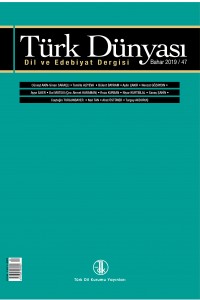Abstract
According to the research carried out on the basis of the etymological
dictionaries, the word Kut, which has existed in all historical and
modern Turkic dialects since the oldest periods of Turkish, has a lot of
meaning that changes depending on the period and dialect. In the Kyrgyz
culture, we found that the concept of kut ‘happiness’ consists of aspects
of the abstract-concrete, external and internal world. The abstract plane
consists of such concepts as “god” and “luck”, which are associated with
the perception of people of the outside world and such as “soul”, “spirit”,
“heart”, “life energy”, which are associated with the perception of their
inner world. We found that a specific plane consists of tangible objects,
such as “talisman”, “idol”. The word kut in the general Turkic language
contains the traces of the ancient Türkic faith and carries in itself as an
abstract plane expressing «luck», «will», «happiness», which people believe
they receive from God, and the expression of a concrete plan, as a
guardian, which in reality, is no longer used in everyday life as an instrument
of protection against the evil eye because of the influence of
Islamic beliefs. It became clear that the amulet, which until recently existed
among the Kyrgyz but whose specimens are found today only among
the Siberian people, and made of blue or red cloth, symbolizes the Yağız
Yer and Kök Teñri existing in the old Turkic beliefs. As in other Turkic
people, it can be seen that the word kut is used both in the names of boys
and girls, because it expresses a positive meaning in the language.
References
- Abduldayev, E. ve diğerleri (1965). Kırgız Dilinin Açıklamalı Sözlüğü (Kırgız Tilinin Tüşündürmö Sözdüğü). Frunze: Mektep.
- Batislam, H. Dilek (2002). “Divan Şiirinin Mitolojik Kuşları: HÜMÂ, ANKA VE SİMURG”. Türk Kültürü İncelemeleri Dergisi, 185-208.
- Bitikçi, Eleri (2017). “40 Elementov Kırgızskoy Kulturı”. Kod Kırgızov, Akipress elektronik gazetesi: http://kgcode.akipress.org/unews/un_post:9112 erişim tarihi: 08.03.2018
- Bogenbayev, N; Calmırza, A. (2014). “Eski Türk Dünya Görüşündeki “Kut” ve “Karga” kavramları”. Milli Folklor Dergisi, 26, 103.
- Caparov, Ş. (2004). Adam Attarı -El Baylıgı. Bişkek.
- Çelik Şavk, Ü. (2002). Kırgız Atasözleri. Ankara: TDK Yayınları.
- Ercilasun, A. B. (2016). Türk Kağanlığı ve Türk Bengü Taşları. İstanbul: Dergâh Yayınları.
- Gülensoy, T. (2011). Türkiye Türkçesindeki Türkçe Sözlüklerin Köken Bilgisi Sözlüğü. C 1, Ankara: TDK Yayınları.
- Findley, C. V. (2008). Dünya Tarihinde Türkler. İstanbul: Kitapyayınevi.
- Hargitai, Q. (2018). “Nazarlığın Tarihsel Kökeni Nereye Dayanıyor?”. BBC Culture: www. bbc.com/turkce/vert-cul-43116420 erişim tarihi:08.03.2018.
- İsi, H. (2018). Eski Uygur Türkçesinde “Kut Kıv” İkilemesinde Geçen “Kıv” Sözcüğünün Tarihi Metinlerinden Türkiye Türkçesine Serüveni”. Dede Korkut Dergisi, 15, C 7, 32-53.
- Karakaş, S. (2018). “Kut-Tanrı İlişkisi Bağlamında Türklerde Yönetim Erkinin İlâhî Temelleri”. KUT (Editör: Yaşar Kalafat), Ankara: Berikan Yayınları.
- Levitskya, L. S. ve diğerleri (2000). Türk Dillerinin Etimolojik Sözlüğü (Etimolojiçeskiy slovar tyurkskix yazıkov). Moskva: Nauka Yayınları.
- Nadelyaev, V. M. ve diğerleri (1969). Eski Türkçe Sözlük (Drevnetyurkskiy Slovar’). Leningrad: Nauka Yayınları.
- Nayzabekova, A. (2016). Kırgız Uluttuk Oymo. Bişkek: Arip-Press Basımevi.
- Orozbayev, M. (2014). Kırgızcadaki İslam Öncesi Geleneksel İnanç ve İnanışlarla İlgili Söz Varlığı, Ankara: TDK Yayınları.
- Osmonova, C. ve diğerleri (2001). Kırgız Tilinin Frazeologiyalık Sözdüğü. Bişkek, Manas Üniversitesi.
- Tekin, T. (1998) Orhun Yazıtları. İstanbul: Simurg Yayınları.
- Yudahin, K. (1985a). Kırgızca-Rusça Sözlüğü. C 1, Frunze: Kırgız Ansiklopedisi Yayınları.
- Yudahin, K. (1985b). Kırgızca-Rusça Sözlüğü. C 2, Frunze: Kırgız Ansiklopedisi Yayınları.
Abstract
References
- Abduldayev, E. ve diğerleri (1965). Kırgız Dilinin Açıklamalı Sözlüğü (Kırgız Tilinin Tüşündürmö Sözdüğü). Frunze: Mektep.
- Batislam, H. Dilek (2002). “Divan Şiirinin Mitolojik Kuşları: HÜMÂ, ANKA VE SİMURG”. Türk Kültürü İncelemeleri Dergisi, 185-208.
- Bitikçi, Eleri (2017). “40 Elementov Kırgızskoy Kulturı”. Kod Kırgızov, Akipress elektronik gazetesi: http://kgcode.akipress.org/unews/un_post:9112 erişim tarihi: 08.03.2018
- Bogenbayev, N; Calmırza, A. (2014). “Eski Türk Dünya Görüşündeki “Kut” ve “Karga” kavramları”. Milli Folklor Dergisi, 26, 103.
- Caparov, Ş. (2004). Adam Attarı -El Baylıgı. Bişkek.
- Çelik Şavk, Ü. (2002). Kırgız Atasözleri. Ankara: TDK Yayınları.
- Ercilasun, A. B. (2016). Türk Kağanlığı ve Türk Bengü Taşları. İstanbul: Dergâh Yayınları.
- Gülensoy, T. (2011). Türkiye Türkçesindeki Türkçe Sözlüklerin Köken Bilgisi Sözlüğü. C 1, Ankara: TDK Yayınları.
- Findley, C. V. (2008). Dünya Tarihinde Türkler. İstanbul: Kitapyayınevi.
- Hargitai, Q. (2018). “Nazarlığın Tarihsel Kökeni Nereye Dayanıyor?”. BBC Culture: www. bbc.com/turkce/vert-cul-43116420 erişim tarihi:08.03.2018.
- İsi, H. (2018). Eski Uygur Türkçesinde “Kut Kıv” İkilemesinde Geçen “Kıv” Sözcüğünün Tarihi Metinlerinden Türkiye Türkçesine Serüveni”. Dede Korkut Dergisi, 15, C 7, 32-53.
- Karakaş, S. (2018). “Kut-Tanrı İlişkisi Bağlamında Türklerde Yönetim Erkinin İlâhî Temelleri”. KUT (Editör: Yaşar Kalafat), Ankara: Berikan Yayınları.
- Levitskya, L. S. ve diğerleri (2000). Türk Dillerinin Etimolojik Sözlüğü (Etimolojiçeskiy slovar tyurkskix yazıkov). Moskva: Nauka Yayınları.
- Nadelyaev, V. M. ve diğerleri (1969). Eski Türkçe Sözlük (Drevnetyurkskiy Slovar’). Leningrad: Nauka Yayınları.
- Nayzabekova, A. (2016). Kırgız Uluttuk Oymo. Bişkek: Arip-Press Basımevi.
- Orozbayev, M. (2014). Kırgızcadaki İslam Öncesi Geleneksel İnanç ve İnanışlarla İlgili Söz Varlığı, Ankara: TDK Yayınları.
- Osmonova, C. ve diğerleri (2001). Kırgız Tilinin Frazeologiyalık Sözdüğü. Bişkek, Manas Üniversitesi.
- Tekin, T. (1998) Orhun Yazıtları. İstanbul: Simurg Yayınları.
- Yudahin, K. (1985a). Kırgızca-Rusça Sözlüğü. C 1, Frunze: Kırgız Ansiklopedisi Yayınları.
- Yudahin, K. (1985b). Kırgızca-Rusça Sözlüğü. C 2, Frunze: Kırgız Ansiklopedisi Yayınları.
Details
| Primary Language | Turkish |
|---|---|
| Subjects | Language Studies, Turkish Folklore, Creative Arts and Writing |
| Journal Section | Articles |
| Authors | |
| Publication Date | March 29, 2019 |
| Published in Issue | Year 2019 Issue: 47 |


